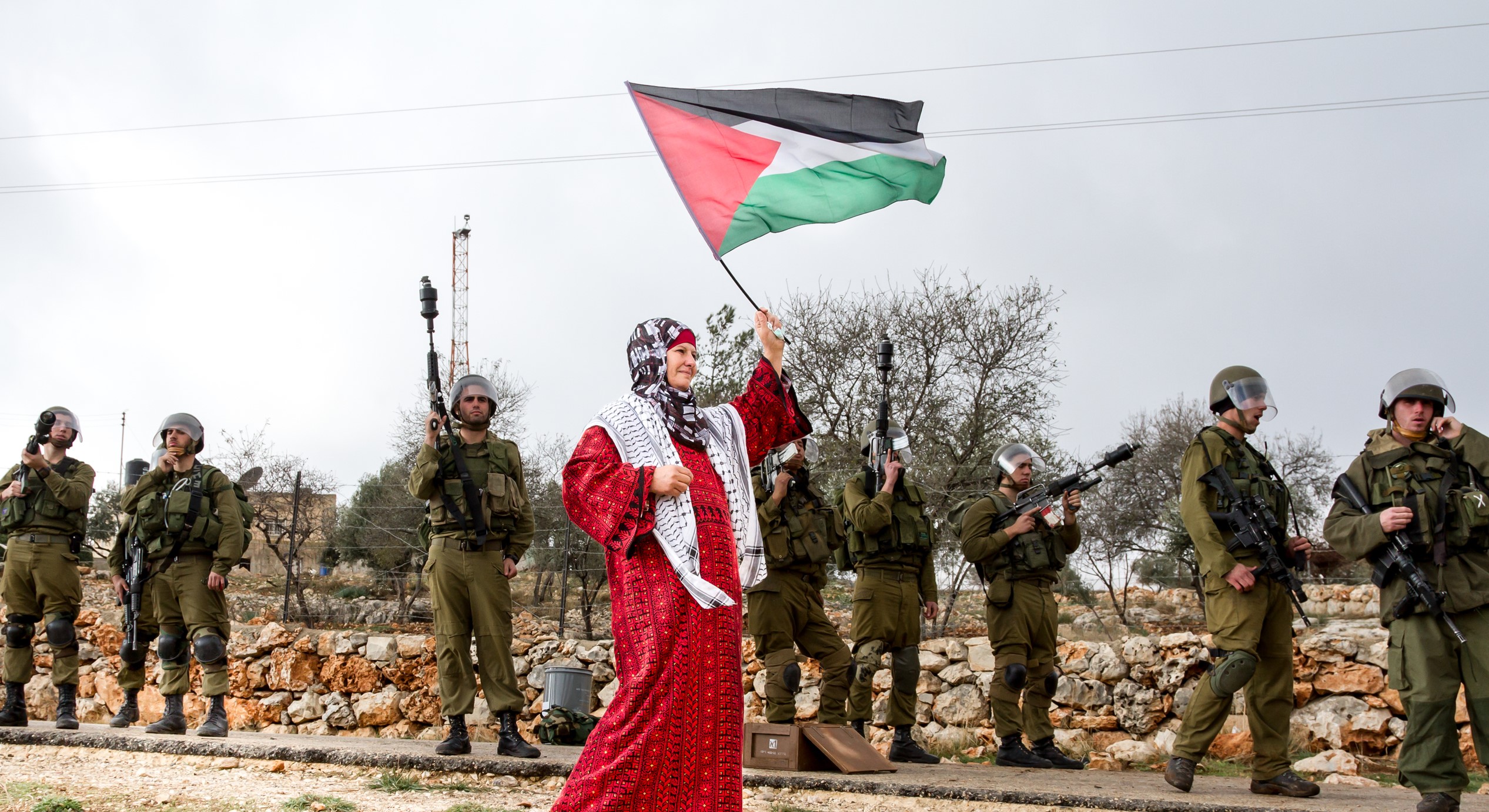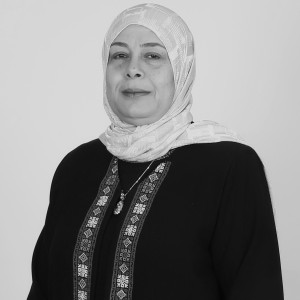

From
the Land of Palestine to the World -
For over a year, we have been glued to our televisions and social media, which transmit to us live the facts of an unprecedented war on the Gaza Strip and Lebanon, during which the most heinous war crimes are committed, one after the other, with a permanent censor and present documentation, but without accountability. The war has affected people, trees, today's capacities, future possibilities, and people's choices. People ask daily: What happened to human rights and international humanitarian law? Where are international and UN institutions from what is happening? Where is the women, peace and security agenda that will celebrate next year the twenty-fifth anniversary of UN Security Council Resolution 1325 on women, peace, and security (WPS)?
Since 2000, Palestinian women have been involved in working on the WPS agenda, completing two national plans and national coalitions and alliances, to no avail. They could not contribute to ending the Palestinian division or achieving any gains related to political participation or political representation. Undoubtedly, many reasons and justifications lie behind this reality. However, there must also be a critical view of the effort that has been made so far and has not bore fruit.
The international agenda for peace and security is based on Security Council Resolution 1325 and subsequent resolutions on women's participation and the resulting preparation of national plans known as (NAP), based on four pillars: women's participation in negotiation efforts and peacemaking, protecting women from the effects of wars and conflicts, specifically sexual violence and gender-based violence, preventing conflict and wars, mitigating the impact of wars, and recovery. However, the situation in Palestine and Lebanon today constitutes a disastrous failure of this liberal agenda that focuses on formalities represented in preparing good plans on paper that cannot be implemented. The current balance of power does not ensure women's and civilians' protection. Humanitarian aid is a bargaining chip and pressure tool instead of a guaranteed right. What is most important is the abject failure of accountability mechanisms for war criminals and the international system's inability to issue binding decisions to stop the war.
WPS is a liberal agenda that exploits women based on their suffering, specifically in the field of sexual violence and gender-based violence. It has ready-made templates that lead to the production of identical national plans without any possibility for accountability. In Lebanon, which is also suffering from the ravages of the protracted war, the national plan was prepared in 2019, as in Iraq, Yemen, Syria, and other countries in the region. Thus, can women play an actual role in peace, security, and resistance to war, other than the one we see daily as victims suffering from bereavement, pain, and loss, or what we hear from daily testimonies about the extent of suffering, starvation, thirst, deprivation of shelter, and the simplest necessities of life?
In the first days of the war on Gaza, relief and humanitarian organizations received successive calls from women's organizations in the Gaza Strip and the region asking what we can do? What can we offer people to alleviate their pain and support our local communities? Women’s and women-led organizations were the first to rush to help the bereaved community in Gaza. Women bit their bullets and opened the doors of their organizations to the crowds streaming in from the north of the Gaza Strip, providing them with shelter, food, and psychological support, and resolving minor community disputes and conflicts that arose from overcrowding. As a feminist activist who follows women’s movements in the region, I know very well that women are always the first to mobilize to alleviate the pain of their communities, the first to provide community support, and the last to have their contributions recognized. We have seen this in Yemen, Syria, Iraq, Gaza, and Lebanon. The moment humanitarian work is institutionalized and humanitarian response plans and sectors are presented, women find themselves in specific sectors such as protection - or combating gender-based violence. Women are absent from specialized sectors or in sectors of crucial decision-making, and they are completely absent from any political discussions or negotiations to calm - or stop the war.
Hence, the huge gap between the assumptions of the liberal content (participation, protection, prevention, and recovery) in the WPS agenda and the reality of our societies that suffer from recurring wars and crises, is clear. This agenda assumes that women can be effective in establishing peace and security, but does not recognize their daily contributions to preserving the social fabric and supporting societies that have been afflicted and destroyed by systematic genocide and continuous destruction. In other words, women are present at the grassroots and in community work, but are completely absent from making important decisions.
In contrast, the feminist WPS vision recognizes a fundamental imbalance in the international, national, and societal power. At the international level, there is the use of the veto right, a dominant force, and a rogue state that cannot be subjected to international law or any accountability system. At the national level, there is an imbalance in the control of certain groups over power without renewing legitimacy or integrating women into any economic decisions or decision-making positions. At the social level, gender gaps continue to deepen and exclude women and youth, using them through their reproductive role. Hence, feminist criticism of the WPS agenda sees that instead of bringing ready-made templates or desperate "cosmetic" attempts to place women who do not have a feminist vision and identify with the dominant power in important positions such as the diplomatic corps, ministries, or the judiciary, the role of women in protecting the social fabric must be recognized, far from narrow factional, partisan and sectarian interests. These women and their institutions should represent their societies during war, the recovery phase, reconstruction, and any negotiations to end the war or to establish security and peace. This vision strives to overcome historical injustice and gender inequality in our societies. It also realizes that the suffering of wars affects all members of society: men, women, boys and girls, and steers away from demonizing our men and portraying them as extremists and violent and our women as crying victims.
A feminist vision of security and peace realizes that the balance of power goes beyond wars on the ground. It and comes in the form of a hand extended with humanitarian aid and another that continues to sell weapons used in war, or rises to use the right of veto in the Security Council to prevent decisions to stop the war. Peace and security decisions cannot be made under a unilateral global system that listens to one narrative, refuses to recognize any other, and even places the burden of narratives on those who suffer the scourge of war, and whose blood, remains, and destroyed homes are not enough to establish a different narrative.
Even the best written plans for the WPS agenda led by UN agencies and a symbolic partnership of governmental and non-governmental institutions will fail to change the reality suffered by this region, from the largest gender gap in the world, to the complete absence of women and youth of all stripes from important decisions, the shackling and restriction of civil society, the gagging of mouths under the pretext of maintaining security, the peaceful transfer of power and fair and honest periodic elections remaining a distant dream, and the fact that youth who constitute more than 50% of our societies do not find an outlet for their energies and capabilities, so they flee in boats of death in search of a better life. Thus, funding comes through the WPS agenda to combat extremism, terrorism, and violence in formal programs that do not change anything in the lives of societies.
Alternatives from a feminist perspective exist. They are against wars in all their forms. They call for the achievement of justice and equality and the enjoyment of rights by societies on their land, practicing their lives without "demonization," and building on what "unites us" and not on "what divides us", away from ready-made templates and within local national contexts that preserve everyone's choices.
In light of the ongoing violations of human rights and international humanitarian law during the war on Gaza and Lebanon, and the inability of the international system to stop crimes against humanity, the signs of the collapse of the global system as we have known it since World War II, which has always been keen on delicate balances and red lines that cannot be crossed, are becoming clear. It is time for alternative feminist visions for peace and security that are developed locally and not to maintain an imaginary balance of power. These visions challenge the existing systems of oppression and authority that work to link human rights, international humanitarian law and humanitarian aid to the interests of the stronger party and not to the interests of the peoples of the earth. It is time for an alliance of peoples and feminist movements in the face of hegemony and to preserve the rights inherent in our humanity.
Recent publications

